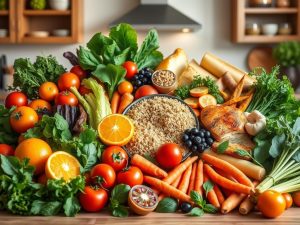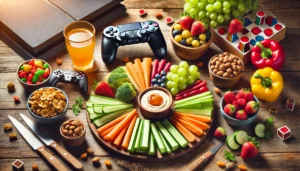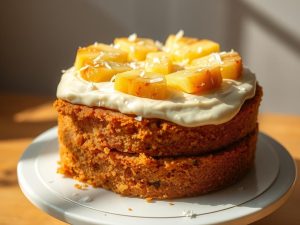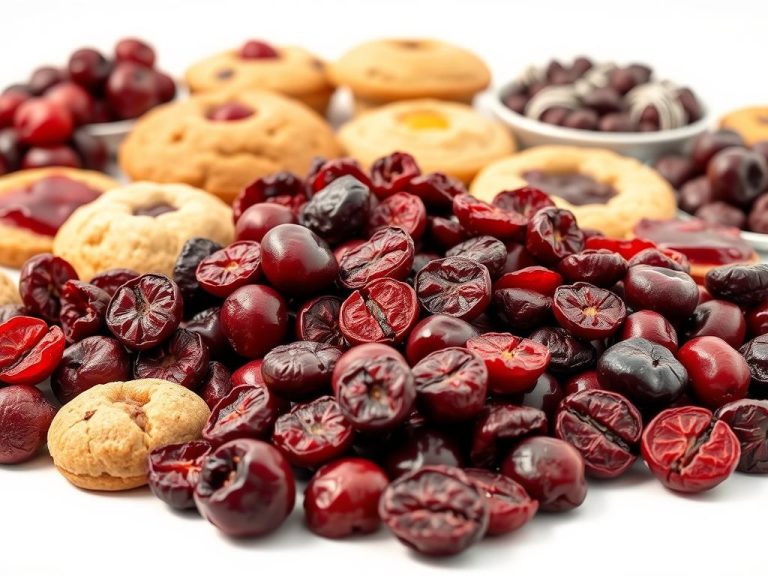Try these healthy foods if you play College Football
As a college football player, eating right is key for top performance. A balanced diet full of nutrients boosts your strength, speed, and endurance. With only a few games each season, every meal counts to fuel your body, much like studying college football odds to stay prepared.
To boost your game, eat a variety of healthy foods. Focus on complex carbs, lean proteins, and healthy fats. They give you energy, help muscles heal, and reduce inflammation. For some healthy meal options, check out these meal prep protein pasta recipes. Also, drink plenty of water to stay energized and avoid cramps.
Talking about nutrition with teammates should focus on how food helps you perform better. Mention how certain foods can improve your strength, speed, and recovery. A healthy diet is essential for success on the field.
Key Takeaways
- Complex carbohydrates provide easily burnable energy for explosive movements
- Lean proteins aid in muscle repair and growth
- Healthy fats reduce inflammation and support joint health
- Staying hydrated is crucial for maintaining energy and preventing cramps
- Emphasize performance benefits when discussing nutrition with teammates
The Role of Nutrition in Athletic Performance
Good nutrition is key for top athletic performance. It helps with strength, endurance, and recovery. College football players need the right mix of nutrients to shine on the field.

How proper nutrition impacts strength, endurance, and recovery
Eating a balanced diet is crucial. It should have enough calories, carbs, proteins, and fats. Without it, athletes may feel tired, perform poorly, and risk injuries.
Explanation of how different food groups contribute to athletic performance
Each macronutrient has its role in athletic success:
- Carbohydrates: They are the main energy source for intense activities. They keep glycogen stores up and prevent exhaustion.
- Proteins: They are vital for muscle repair and growth. Proteins also boost the immune system and hormone production.
- Healthy Fats: They are important for hormone production and nutrient absorption. They also help reduce inflammation. Healthy fats should make up 20-35% of an athlete’s diet.
Brief mention of nutritional requirements for college athletes compared to average individuals
College football players need more calories and nutrients than regular people. During intense training, they might need over 10,000 calories a day. To meet these needs, they should eat nutrient-rich foods and drink plenty of water.
An ideal diet for football players requires 55 to 60 percent of their daily caloric intake to come from carbohydrates, 15 percent from protein, and 30 percent from fat.
By focusing on nutrition, college football players can improve their performance. They can keep their strength and endurance up and recover better.
Top Food Groups for College Football Players
College football players need a balanced diet to perform well. The Gatorade Sports Science Institute says focus on lean proteins, complex carbs, healthy fats, and vitamins. These are key for success.

Lean Proteins for Muscle Repair and Growth
Lean proteins are vital for muscle repair and growth. They help fix muscles damaged during games and training. Good sources include:
- Chicken breast
- Turkey
- Fish (such as salmon, tuna, and cod)
- Lean cuts of beef
- Eggs
- Low-fat dairy products (like Greek yogurt and cottage cheese)
- Legumes (beans, lentils, and peas)
Complex Carbohydrates for Sustained Energy
Complex carbs give energy that lasts. This is key for players needing to stay strong during games and practices. Good sources are:
- Whole grain bread, pasta, and rice
- Quinoa
- Oats
- Sweet potatoes
- Fruits (like bananas, apples, and berries)
- Vegetables (such as broccoli, spinach, and carrots)
Healthy Fats for Reducing Inflammation and Supporting Joint Health
Healthy fats are important for reducing inflammation and supporting joints. They help players who stress their bodies a lot. Good sources are:
- Avocados
- Nuts (like almonds, walnuts, and cashews)
- Seeds (such as chia, flax, and pumpkin)
- Olive oil
- Fatty fish (like salmon and sardines)
Vitamins and Minerals for Optimal Functioning
Vitamins and minerals keep the body healthy and working well. Players should eat lots of fruits and veggies for these nutrients. Important ones include:
- Vitamin C (found in citrus fruits, berries, and bell peppers)
- Vitamin D (found in fatty fish, egg yolks, and fortified dairy products)
- Calcium (found in dairy products, leafy greens, and fortified plant-based milks)
- Iron (found in lean meats, legumes, and spinach)
- Potassium (found in bananas, sweet potatoes, and avocados)
By eating a mix of lean proteins, complex carbs, healthy fats, and vitamins, players fuel their bodies. This helps them perform well on and off the field.
Sample Healthy Meals for College Football Players
As a college football player, it’s key to eat right to perform well. Good meal planning and healthy food choices are crucial. Here are some meals to help you stay on track with your diet.
Breakfast Ideas
Begin your day with a filling breakfast. It should give you energy for workouts and classes. A typical breakfast has 800-1000 calories. Try a homemade smoothie with strawberries, banana, protein powder, oats, peanut butter, and milk for a nutritious meal.
Lunch Ideas
Lunches for football players are about 800 calories. They should have lean protein, complex carbs, and healthy fats. Meal prep helps you have a healthy lunch ready. A chicken, rice, vegetable, and avocado bowl is a great option.
Dinner Ideas
Dinner is important after a long day. It should have about 1000 calories. You can have dining hall meals, meal prep like spaghetti or tacos, or eat out at places like Chipotle. Just watch your portion sizes and choose balanced meals.
Snack Ideas
Snacks are vital for energy and muscle recovery. They can be 200 to 600 calories. Good snacks include protein bars, fruit, nuts, peanut butter with banana, Cheerios, protein shakes, and Greek yogurt with almond butter and frozen fruit.
| Meal | Sample Menu | Calories |
|---|---|---|
| Breakfast | Smoothie with protein powder, oats, peanut butter, and fruit | 800-1000 |
| Lunch | Chicken, rice, vegetables, and avocado bowl | 800 |
| Dinner | Spaghetti with lean ground beef and tomato sauce, side salad | 1000 |
| Snacks | Protein bar, fruit, nuts, Greek yogurt with almond butter | 200-600 |
Remember, every athlete is different, so it’s important to work with a sports nutritionist or registered dietitian to develop a personalized meal plan that meets your unique needs and goals.
By focusing on healthy meals and meal planning, you can fuel your body for top performance on and off the field.
Hydration: An Often Overlooked Aspect
Proper nutrition is key for college football players, but hydration is just as important. It helps keep players performing well, prevents injuries, and keeps them healthy. A study showed that even though athletes knew about hydration, they didn’t always practice it.
Importance of Staying Hydrated for Football Players
Staying hydrated is crucial for football players. It helps control body temperature, keeps blood flowing, and delivers nutrients to muscles. Without enough water, players can feel tired, perform poorly, and risk heat-related illnesses. Athletes who train hard need to drink more water to stay hydrated.
Role of Electrolytes in Maintaining Energy and Preventing Cramps
Electrolytes like sodium and potassium are vital for energy and preventing muscle cramps. Athletes lose these through sweat, which can upset the body’s balance. A study showed that linemen, a specific group of players, need to replenish these electrolytes to avoid cramps.
Players should eat at least three meals a day and snack in between intense training. They should also drink sports drinks to replace lost electrolytes. This is especially important for players who sweat a lot.
Suggestions for Hydration Practices
To stay hydrated, football players should follow these tips:
- Drink 16 ounces of fluid one hour before exercise
- Consume 20 to 40 ounces of fluid per hour of practice
- Drink 24 ounces of fluid for every pound lost during exercise
- Include sports drinks with optimal levels of carbohydrates and electrolytes (4% to 6%) to maintain hydration and blood glucose levels during endurance sports
- Consider using electrolyte supplements, especially for players who are “salty sweaters”
| Hydration Practice | Recommendation |
|---|---|
| Pre-exercise hydration | 16 ounces of fluid one hour before exercise |
| Hydration during practice | 20 to 40 ounces of fluid per hour |
| Post-exercise hydration | 24 ounces of fluid for every pound lost |
| Sports drink composition | 4% to 6% carbohydrates and electrolytes |
By focusing on hydration, college football players can keep their energy up, avoid cramps, and perform better on the field.
Additional Nutrition Tips for College Athletes
As a college athlete, eating right is key to doing your best and staying healthy. Here are some extra tips to remember:
The importance of meal timing (pre-game and post-game nutrition)
When and what you eat matters a lot for your performance and recovery. Eating the right foods at the right times is crucial. Experts say to eat a snack full of carbs 45 minutes to an hour before a game to keep your energy up.
After a game or practice, eat a snack with six grams of protein and 35 grams of carbs within 30 minutes. This helps refill your energy and fix your muscles.
“Supplement bars or shakes can be beneficial post-game for athletes who lack immediate access to food.”
Using supplements wisely: protein powders, BCAAs, multivitamins
Supplements can be helpful, but they shouldn’t be your main food source. Protein powders, BCAAs, and multivitamins can help fill in nutritional gaps. But, always talk to a sports nutritionist or dietitian before using them. A balanced diet should always be your first choice.
Avoiding processed foods and added sugars
It’s important for college athletes to eat less processed foods and sugars. These foods often don’t have the nutrients you need and can make you gain weight and feel inflamed. Instead, choose whole foods that are good for you. Making smart food choices and not eating too many calories from things like alcohol will help you reach your athletic goals.
| Tips for College Athletes | Explanation |
|---|---|
| Meal planning and prepping | Critical for success in dialing in nutrition and ensuring athletes have enough of the right foods to meet their goals |
| Consulting experts (coaches, athletic trainers, physicians, nutritionists) | Seeking guidance from professionals can help athletes develop individualized nutrition plans based on factors like gender, age, and sports position |
| Focusing on performance and health | Rather than striving for specific body aesthetics, athletes should prioritize fueling their bodies for optimal performance and overall well-being |
By following these nutrition tips, college athletes can improve their performance and stay healthy for the long term.
Conclusion
Proper nutrition is key for college football players to perform well and stay healthy. By eating healthy for college football, athletes get the fuel they need. They should eat lean proteins, complex carbs, and healthy fats. These foods help with muscle repair, energy, and joint health.
It’s also important to stay hydrated. Eating right before and after games is crucial. Using supplements wisely and avoiding processed foods can help too. Studies show that teaching players about food choices can guide them to make better choices.
With the right knowledge and habits, college football players can improve their game and health. Healthy eating for college football is about more than just fueling up. It’s about building habits that benefit you both on and off the field, now and in the future.
FAQ
What percentage of a football player’s daily caloric intake should come from carbohydrates?
Football players should aim for 55 to 60 percent of their calories from carbs. The rest should come from protein (15 percent) and fat (30 percent).
How should a football player’s plate look at each meal?
A football player’s plate should resemble a peace sign. One-third should be protein, one-third a starch, and the last third fruits and veggies.
Why is it important for football players to consume enough carbohydrates?
Football demands quick energy bursts. So, carbs are key. More carbs mean more energy for practice and games.
What are some good protein sources for football players?
Good protein sources include red meat, poultry, fish, eggs, and dairy. Also, beans, nuts, and soy products are great options.
What are some healthy carbohydrate sources for football players?
Healthy carbs include rice, pasta, potatoes, fruits, and veggies. Choose lower-fat options like bagels over doughnuts and grilled chicken over fried.
How many calories do college football players need during preseason two-a-day practices?
College players need more calories, especially during intense preseason practices. They might need over 10,000 calories a day.
What are some good breakfast ideas for football players?
A large homemade smoothie with strawberries, banana, protein powder, oats, and peanut butter is a great start. It has 800-1000 calories.
How much fluid should football players drink before, during, and after exercise?
Drink 16 ounces of fluid an hour before exercise. During practice, aim for 20 to 40 ounces per hour. Replace lost fluids with 24 ounces for every pound lost. This prevents heat illnesses and keeps performance up.
What should football players eat after a game or practice for optimal recovery?
After games or practice, eat a snack with 6 grams of protein and 35 grams of carbs within 30 minutes. This aids in recovery.
How can supplements support a football player’s nutrition plan?
Supplements like protein powders, BCAAs, and multivitamins can help. But, they shouldn’t replace main nutrients.













